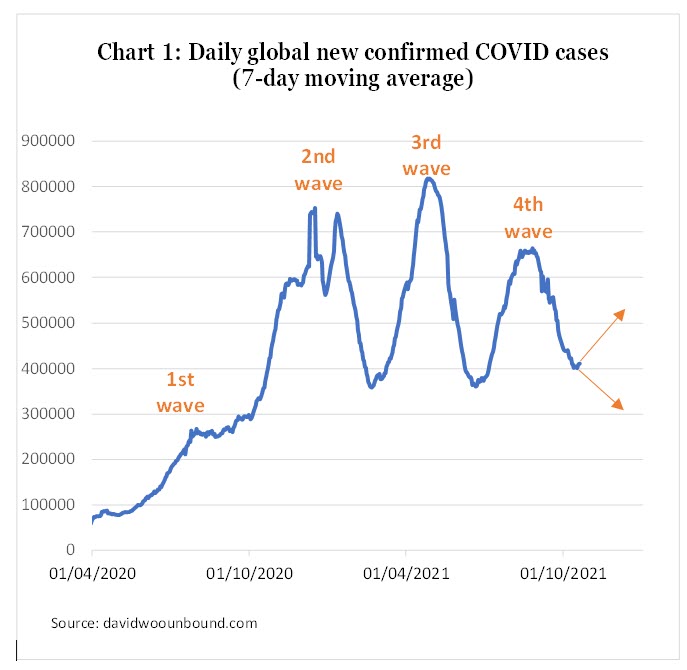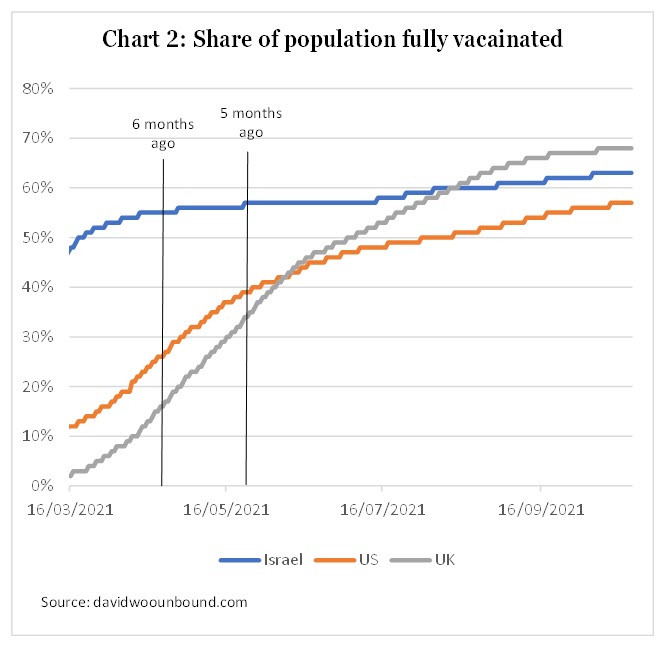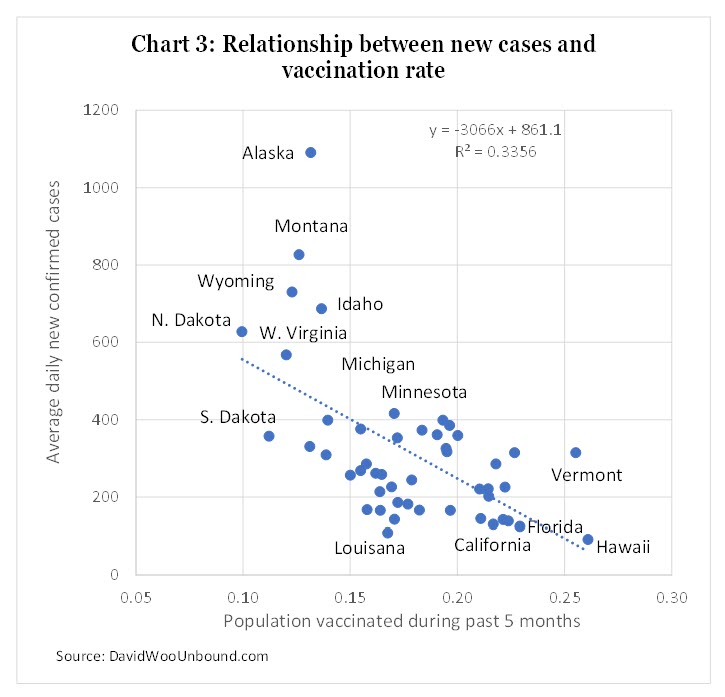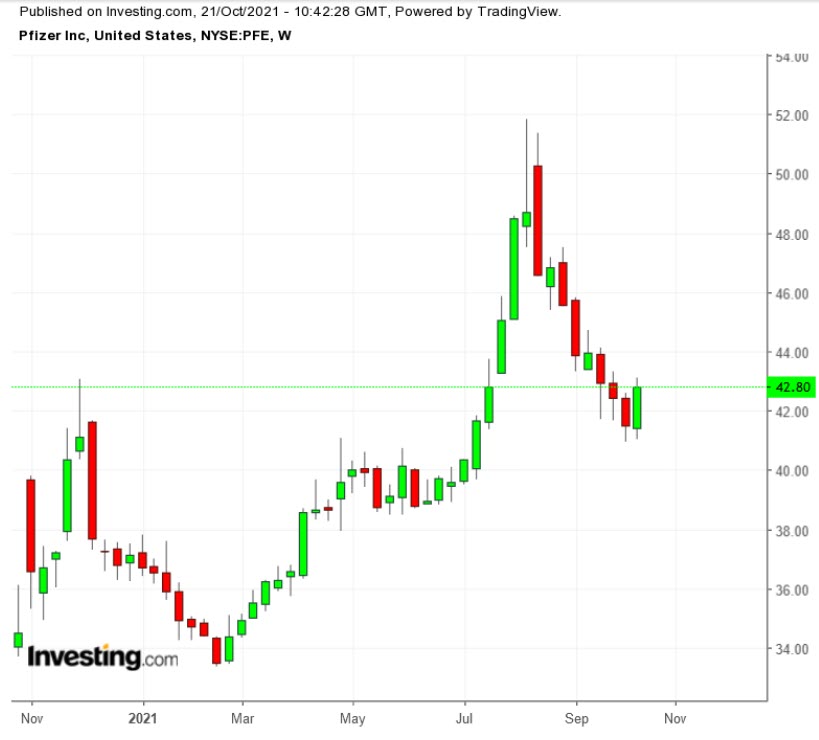Financial markets seem to be operating under the assumption that COVID is under control and the pandemic is fading.

Charts: courtesy David Woo
Over the past six weeks, investors have been celebrating the tumbling numbers of new COVID cases around the world by moving their money out of vaccine stocks (e.g., Pfizer (NYSE:PFE) and Moderna (NASDAQ:MRNA) and into what the market has been calling re-opening stocks (e,g., restaurants, hotels, leisure), sectors that will benefit as the world returns to what we remember as the old normal.
That may be a mistake.
Humans are optimistic by nature. Most people, thirsting for the day that normal life returns, want to believe that science has triumphed over disease. And most investors, even big institutional ones, are only human.
So am I, but I'm also a contrarian. I like to find flaws in other people’s logic. In fact, I built a career on Wall Street betting against popular but flawed views.
And I believe the market is ignoring the two most important lessons we have learned from the pandemic so far:
- COVID-19, like all RNA viruses, has a propensity for mutation. The variant that was responsible for each of the past 4 waves was more virulent and more contagious than the previous one. It seems reasonable to assume that it is only a question of when before we see new variants against which the existing vaccines will prove ineffective.
- Even though 40% of the world’s population is now fully vaccinated, the effectiveness of the vaccine wanes over time. During this summer, Israel, the first country in the world to reach 50% vaccination rate, saw a resurgence of the pandemic that forced the country into another shutdown. At one point 60% of the hospitalized patients had been fully vaccinated.
Israel’s experience shows that the effectiveness of the vaccines (Pfizer specifically) wanes after 5-6 months. If we take that as a given, then it is reasonable to conclude that at this point the majority of fully vaccinated Americans have now lost protection from the vaccines.

This should be concerning. The arrival of colder weather means people will spend more time indoors while the onset of the accompanying flu season will leave their immune system weakened.
Meanwhile, Americans have let down their guard: schools have re-opened and mask requirements have been dropped in most US states. Even more crucially, the US Food and Drug Administration (FDA) has decided to recommend administering the booster vaccine only to those over the age of 65 as opposed to Israel, where anyone over the age 12 can get it, and to the UK, where the boosters are available to people over 50.
I hope I am wrong, but I believe the market is underestimating the risk that we will soon see a fifth COVID wave in the US.
Evidence suggests that the dynamic I fear is not hypothetical. Indeed, my analysis shows that on average, US states with a relatively low share of their population vaccinated over the past 5 months are currently seeing a higher number of new infections than those states with a relatively larger share of their population vaccinated over the last 5 months.

Over the next month, unless the FDA changes its booster guideline, most US states will see the level of their fully vaccinated population converge to those of Montana, Wyoming and Alaska today.
Reinforcing my view is the fact that new COVID cases are picking up even in states with a very high vaccination rate. For example, Vermont, which has the highest vaccination rate in the country, is seeing rising number of new cases, with an increasing number of infected people being fully vaccinated. In Europe, over the past week, the UK, Germany, Netherlands, and Denmark, all of which have higher vaccination rates than the US, are seeing their number of cases rise.
How should one hedge against a fifth COVID wave? Bonds should do better than stocks as the Fed might decide to postpone tapering. However, with inflationary pressure continuing to build, we are not in a bond friendly environment. If I am right about the coming fifth wave, the asset that will benefit most clearly is Pfizer stock.

Not only has it been found to be effective for adolescents, the FDA is currently reviewing the company's application for the agency's authorisation to use the vaccine as a 2-dose innoculation for children ages 5-11. That's in addition to the fact that a fifth wave will see increased demand for a third booster.
Plus, health regulators (and the market) might then very well think that an annual booster will be necessary. All this should help support Pfizer, especially given the stock is currently pricing a sharp drop in revenue in 2022.
I think the recent correction in Pfizer has created an attractive entry opportunity. I have been recommending it to the subscribers of my blog.
Full disclosure: I recently bought the stock at $42.
